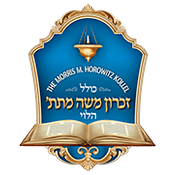Parshas Naso – Shavuos 1


׳׳והי׳ המקריב ביום הראשון את קרבנו נחשון בן עמינדב… קרבנו קערת כסף אחת…׳׳ במדבר ז:יב-יג
“And it was that the one to bring forth his offering on the first day was Nachshon Ben Aminadav… His offering consisted of one silver bowl…”
Bamidbar 7:12-13
The double usage of the word קרבנו -“his offering” in these pasukim must immediately grab our attention. After all, we have been trained to look out for this sort of discrepancy. Further investigation reveals that only this once, by the offering of the tribe of Yehuda, does the pasuk repeat the word קרבנו. Perhaps we can explain the composition of these pasukim based off of a theme, which just so happens to play a central role in the impending חג of Shavuos. The Dvash Hasadeh brings down in the name of the Meor Vshemesh, that when Moshe Rabbeinu commanded Nachshon that as per the order of Hashem, he was to be the first of the tribal leaders to bring forth his offering as part of the inauguration ceremony of the Tabernacle and the אהל מואד , Nachshon was gripped with fear. He may have thought to himself, “Who am I to merit this great honor?” After all, this is the way of the righteous, to lower themselves and flee from honor. The Gemara in Maseches Sotah tells us that this humility is seen in the eyes of Hashem as if the צדיק has brought all of the קרבנות , the sacrificial offerings, as the pasuk in Tehillim states: ׳׳זבחי אלוקים רוח נשברה׳׳ -“The sacrificial offerings that Hashem desires are broken spirits.” This may be the explanation of the pasuk “And the one to bring forth his offering on the first day, was Nachshon ben Aminadav, meaning to say that Nachshon sacrificed himself, that is, he was seen by Hashem as if he had sacrificed himself. Only after his sacrifice of character through excess humility does the pasuk continue to mention his physical offerings of vessels and animals.
Shavuos is זמן מתן תורתינו , the time of our acceptance of the Torah. One of the key points with regard to our ability to gain the precious gift of Hashem’s Torah is humility. We learn this precise lesson from the facts surrounding the entire procedure of Matan Torah. The aforementioned Gemara in Maseches Sotah states not a דף earlier that one should learn from the ways of Hashem to love the humble. For Hashem did not rest His Divine Presence on the prominent mountain crests, rather the שכינה was שורה on lowly Har Sinai. The Gemara in Megillah records the account of Har Tabor and Har Carmel’s schoolyard bullying of little Har Sinai. The Gemara learns from the pasuk of (תהלים סח) ׳׳למה תרצדון הרים גבנונים׳׳ that a heavenly voice rang out, charging the mountains of Tabor and Carmel for picking on Har Sinai. The voice related that all of the towering peaks were blemished in comparison to Sinai and proved its point with a pasuk (או גבן או דק). The Gemara ends off by saying that we learn from here that anyone who is haughty is blemished. The מהרש׳׳א explains that the big mountains claimed that they were more deserving of the Torah to be given on them because of their height advantage over Har Sinai. At which point the בת קול rang out to teach us this lesson in humility.
Har Sinai was quite small and meek compared to the majestic peaks of Tabor and Carmel. Yet this seemingly mediocre mountain was specifically where Hashem chose to rest His Divine Presence and present us, Klal Yisroel, with His תורה הקדושה , to teach us this all-important lesson. The Torah is not, cannot, and will not be attained by those of haughty spirit, who walk around putting on airs and belittling those deemed unworthy or beneath them. Only by lowering our spirits and shying away from honor will we merit true understanding of the Torah and its secrets and be able to be מקבל it with אהבה on this most Awesome day.
Moshe Rothenberg / MMHK
